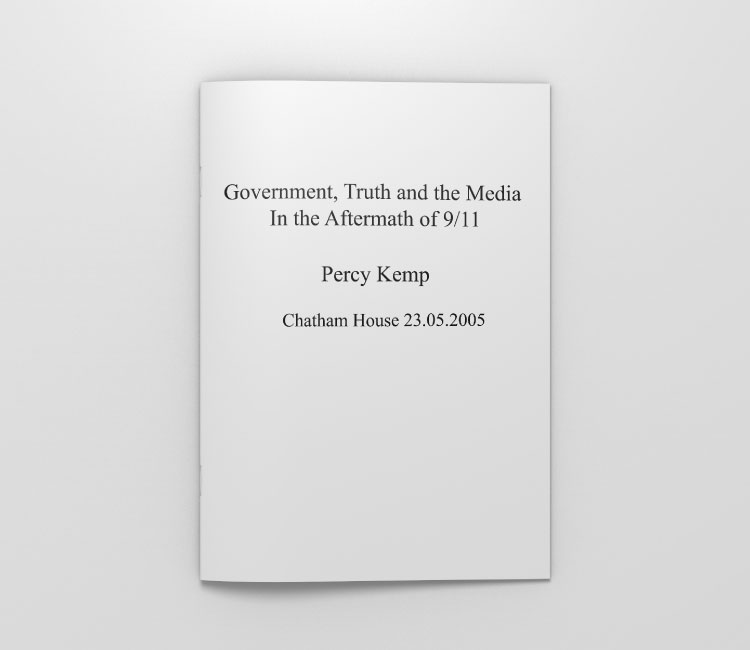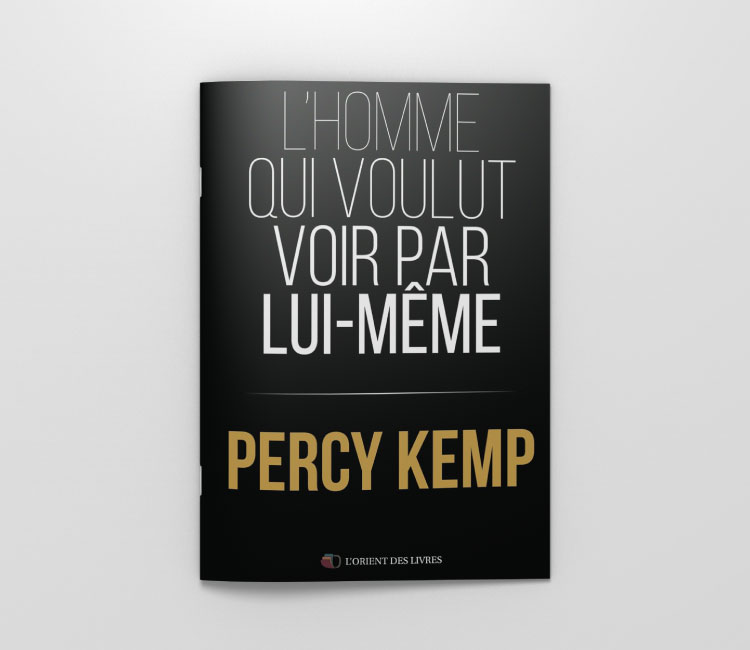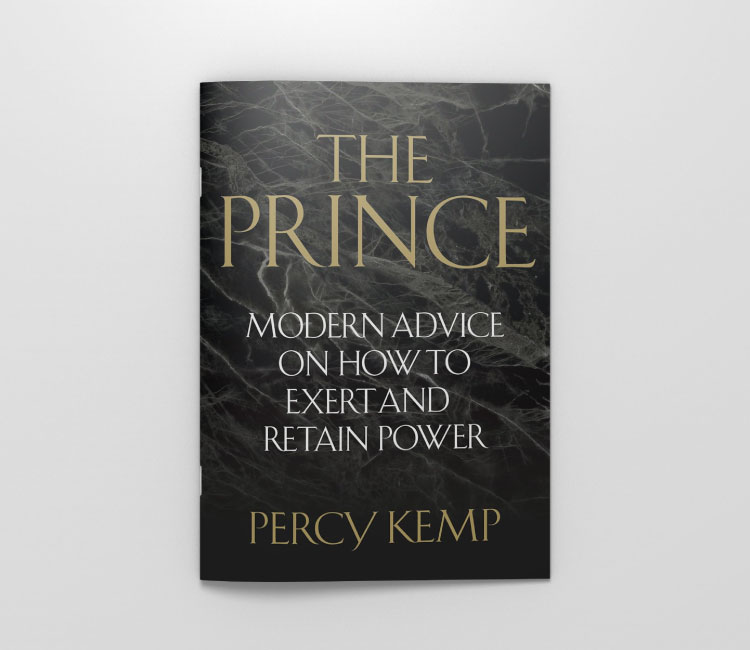Ladies and Gentlemen, I wish to apologize to you for reading from a prepared text. Whereas I am, so to speak by vocation, a good listener, I am also—and no doubt for the same reasons--a poor speaker. My deepest commiserations therefore go to those, seated at the front, and who can’t leave the room discreetly, and my congratulations to those shrewd enough to have seated themselves conveniently near the exit.
I must also apologize for gate-crushing on you under false pretenses. I’m expected to give a paper on “Government, Truth and the Media in the Aftermath of 9/11”. Now that I’m safely in, I might as well confess that I have no experience of Government, that I am no expert on the media, and that a childhood spent at a Jesuit boarding school has left me ill-equipped to deal with the truth.
Not being qualified, I’ve done the next best thing: I’ve applied myself. In the past week or so, I’ve read the papers, listened to the radio and watched television, not, as I normally would, in order to learn what’s going on in the world, but to learn what all this was doing to me. I’ve tried to gauge my reactions, my feelings and my emotions as I was being exposed to the media conveying to me the reality of the world, and here are my findings.
Tonight, I shall argue that truth is no more than a commodity, and that as such it is subject to market laws that determine both the conditions in which it is produced and those in which it is sold. I shall further argue that since the end of the Cold War, and even more so since 9/11, political conditions have not been particularly conducive either to producing the commodity of truth, or to selling it. Truth, I shall argue, is not much in demand nowadays. As a commodity, truth, it seems to me, is as desirable today as are Rover cars.
If Einstein, Rosen and Podolski are to be believed--and I don’t see why they shouldn’t--, agreement among all observers making the same observation is the only possible definition of reality.
More often than not we are able to experience reality at first hand. This is achieved through a combination of sensory perception (what our senses tell us) and of cognitive perception (what our knowledge and our memory tell us). Whenever our senses fail us, our cognitive perception rapidly takes over. For instance, I’m walking my dog on the common on a misty winter evening. A hundred yards ahead of me, I see, shrouded in mist, a shape that looks very much like my dog. I can’t recognize my dog, but I know it is my dog because whereas my sensory perception is failing me, my cognitive perception is telling me it is. As I catch up with it, my senses take charge again, and allow me to ascertain whether my cognitive perception was fooling me or not.
Yet in matters that affect us indirectly, as in international affairs, we are hardly ever able to observe reality at first hand (say, a cabinet decision-making process, or the conduct of a distant war). In such matters we rely on the media.
In fulfilling their role as an interface between us and reality, the media translate reality into language. The language they use may be discursive, as in the case of statements and commentaries, it may be visual, as in the case of films and photographs, and it may be aural, as in the case of sound tracks and musical scores.
By using language to convey reality, the media allow our cognitive perception to gain the upper hand over our sensory perception. Through the media, we perceive reality from the top down, rather than from the bottom up, as we normally should.
Besides appealing to our cognitive perception, the media solicit our rational senses—our vision and our hearing--, rather than our emotional senses (our sense of smell, of taste and of touch). Watching a skirmish in Iraq on television, we see a wounded American soldier and another soldier shouting as he fires frantically. Yet we cannot touch either man. Nor, for that matter, can we smell the gunpowder or experience the distinctly metallic taste of blood.
The media stifle our emotional senses and appeal solely to our rational senses. Our rational senses thus become channels for emotions. They cease to be what they are supposed to be. They cease to be rational. Our ability to perceive reality soundly, and to react coolly, is thus impaired.
How else can one explain that the same pictures of a NASA space shuttle exploding with all on board, should elicit totally different reactions, according to whether the viewer is an American or, say, a Sunni Arab: grief and sorrow on the one hand, elation and vindication on the other.
The Moslems who rioted in Afghanistan and elsewhere after watching pictures of Guantanamo and learning that the Koran had been desecrated there, did so on the basis of their cognitive perception. Did they see the Koran being flushed down the loo? Of course they didn’t. But they know it was, or they think they do. Why? Because of what they think they know about the Americans.
This is not bottom-up sensory perception. This is top-down cognitive perception, and it illustrates the way in which our emotions, knowledge, memory and preconceived ideas shape and deform our perception of reality by entering our brain through our supposedly rational senses.
Because we only perceive reality indirectly, because our three emotional senses are stifled, because our two rational senses become vehicles for emotions, and because our sensory perception is polluted by our cognitive perception and our cognitive perception by our emotions, the kind of agreement among all observers making the same observation, which Einstein insisted is the only possible definition of reality, becomes impossible to attain.
This places an even greater onus on the media to deliver honest and objective reporting. And this is where things get tricky. For discovering the truth is a tedious and painful process. It requires a favourable context and a number of investigative tools and avenues. And it is my contention that nowadays the task of the media in producing the truth is hindered by unfavourable conditions and by a paucity of investigative tools and possibilities.
In fulfilling their role as honest brokers between reality (say, international relations) and the public, the media have traditionally relied on the gap that exists between the conflicting interests of two or more antagonistic parties. In the period between the end of WW2 and the fall of the Berlin Wall, the gap that made the media’s quest for truth possible resided mainly in the antagonism between the Soviet Bloc and the Western democracies. There is a lot to be said for a world carved up between two powerful foes, as opposed to a world dominated by a single power. When two sides are involved, each tries to use the truth to further its own interests, and each, unwittingly, does its bit for the truth.
To illustrate my point, I would compare the way in which the Soviet slaughter of the Cossacks and the British elimination of the Greek Communists were hushed up after Yalta (when the world was dominated by the victorious Allies), to the way in which foul play in Hungary, Czechoslovakia, Vietnam or Chile, was later played up by each side, once yesterday’s allies fell out with one another.
Following the collapse of the Soviet Union, the media’s quest for truth still resided in the dialectical gap that exists, in the West, between Government and civil society. Yet by ushering in a literal state of war, 9/11 has substantially narrowed this gap, causing Government and civil society to coalesce, and doing the truth no service at all.
Concurrently, as clear-cut black and white areas replace the grey areas of the Cold War our aptitude for empathizing with the opposite camp has all but disappeared. Thirty or forty years ago, one could empathize with the Vietnamese Communists and oppose the war in Vietnam without disqualifying oneself. Today, it is out of the question to empathize with the Islamists or to oppose the war on terrorism. Furthermore, there is no defecting possible, no going over to the other side, and no spy exchanges across Gleinicke Bridge and Checkpoint Charlie, or across whatever their Middle Eastern equivalent might be. Grey areas are out, and with them relativity, and the possibility to doubt, nuance and mitigate.
As the US emerges as the sole superpower, and as Government and civil society in the West draw dangerously close to one another, the political discrepancies upon which truth used to feed tend to disappear, and with them the media’s leeway.
Nowadays, the narrow ground upon which investigative journalism lies resides essentially in the mild disputes that may crop up between Western governments (say, between the US and France on Iraq or China), and in the tips and leads leaked by score-settling or dissenting voices within Western governments.
In either case the leeway is limited, and in either case the “other side” (and by this, I mean Islam, the Arabs, etc.) is not involved in the process of producing the truth. Hence, in the matter of Iraqi WMDs, the public row did not come about as a result of Iraqi efforts, but of dissent by officials within the Coalition. Similarly, we only learned that the threat of Syrian WMDs had been exaggerated when US officials sought to foil John Bolton’s nomination to the UN.
Conditions today are not conducive to producing the truth. And they are even less conducive to marketing it. Since 9/11, neither Government nor public opinion seems interested in the truth. Governments and public opinion are now essentially interested in whatever information comforts them in their existing beliefs.
Governments appear to have moved from an empirical modus operandi whereby policy is elaborated on the basis of intelligence, to an ideological modus operandi whereby cherry-picked intelligence is sought to vindicate pre-existing and visionary policies.
And in what is known as public opinion, the Roman plebs has replaced the Roman people, bread and games are now what counts most, and citizens have made way to consumers.
In short, Caesar has crushed the Senate, the Republic has been overtaken by the Empire, and the liberal democracies are turning into populist democracies.
As a result, the commodity of truth is now even more difficult to sell than it is to produce. There are, simply, no buyers. In this respect, it is my opinion that the ongoing process of concentration of the media in the hands of a few powerful financial and industrial groups is not the reason why truth is nowadays hard to sell. Rather, it appears that the concentration of the media in the hands of the plutocrats is made possibly by the fact that the general public is no longer interested in the truth. It is my contention that if the public were still interested in the truth, such a concentration would not have been possible.
We ought no despair, however, since supply and demand nicely balance each other out, and all is for the best in the best of all possible worlds.
Which begs the question of knowing what commodity has displaced the truth in the favours of Government and the public? Which is the new star of the market? Which is the best-seller?
It seems to me that the commodity that is now selling like hot cakes is fear. But this is a topic in itself, which we might touch upon some other day.
Faced with this situation, what can we--as media consumers and as observers of international relations--do? How can we help the truth through this rough patch?
I think that the least we could do is to strive to analyze our reactions and our emotions as we are exposed to the media. We ought to be constantly trying to determine whether the credence we lend to a given comment, picture or piece of news is dictated to us by our rational reasoning, or whether it is dictated to us by our emotions and our convictions. For instance, are we not more likely to lend credence to a press report on instances of Palestinian prisoners being subjected to torture in an Israeli prison, because we happen to be opposed to the policies of the Israeli government? Similarly, if some among you tonight strongly feel that there is a substantial element of truth in what I am saying, could it not be because they believe that I share with them the same irrational feeling for the underdog? And inversely, if some among you tonight are tempted to dismiss my presentation and rubbish it, could it not be because they sense that I am not particularly sympathetic towards the nations to which they belong, and suspicious of the intentions of the governments they support?
Whenever we go out searching for the truth, we should, in fact, be fully aware of the reasons that are pushing us to seek the truth. Are we doing it for the right motives? Are we really seeking the truth so as to be in a position to better judge and to act for the best? Or are we rather seeking the truth merely because it might damage our opponent?
L’enfer est pavé de bonnes intentions, the French like to say. I beg to differ. I believe that in the quest for truth as in everything else, intentions are what count most. Intentions, I believe, make the difference.
Thank you, Ladies and Gentlemen, for your attention and patience.


